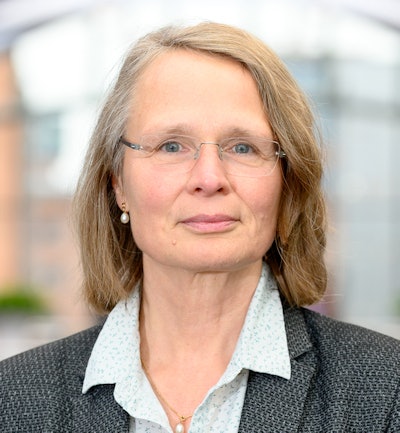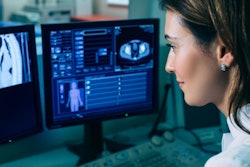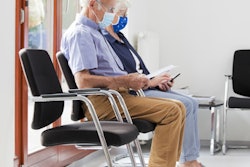
Radiology is still only running at about 60% of normal capacity in the U.K., and hospitals are struggling to cope with the pent-up demand for imaging, according to Dr. Caroline Rubin of the Royal College of Radiologists (RCR).
"We stopped virtually all nonurgent imaging at the start of lockdown (23 March). Everything has been put on a waiting list and deferred so we have a significant backlog going forward," she stated in a report published on 10 June by the Independent newspaper.
Around 45 million imaging exams are carried out each year in the U.K. She said demand is beginning to return as services restart, but radiology departments are having to segregate patients.
 Dr. Caroline Rubin, vice president of clinical radiology at the RCR. Image courtesy of the RCR.
Dr. Caroline Rubin, vice president of clinical radiology at the RCR. Image courtesy of the RCR."In some places patients are being told to wait in their cars until we call them in. We have to clean between each patient but if it's a Covid patient it needs a deep clean which can take half an hour or more," noted Rubin, who is vice president for clinical radiology at the RCR. "We didn't have enough capacity before all this started."
Overall, the National Health Service (NHS) is short of 1,900 radiologists, equating to a third of the workforce, she said. "We are extremely worried, radiologists touch every clinical pathway. Across the board people are being disadvantaged and some of them may be sitting on serious disease, including cancer."
The Independent estimates that "as many as 500,000 CT and 350,000 MRI scans" have been postponed each month in the U.K. since late March, but a spokesperson for the RCR told AuntMinnieEurope.com on 11 June that this figure did not come from the college or from Dr. Rubin and the RCR will soon release its own estimates.
According to an unnamed NHS radiologist quoted in the report, "There are patients waiting to know if they have cancer or not and we can't say when the scan is even going to get done. There will be delays, and a delayed diagnosis could mean a cancer patient goes from a curative to noncurative diagnosis. That's devastating. I think it is inevitable and probably has already happened."
Backlog of pathology tests
In the same article, Prof. Jo Martin, president of the U.K. Royal College of Pathologists, said that up to a million pathology tests could be building up.
"We are about a quarter of the workforce down, nationally. That's 97% of departments who don't have enough pathologists," she stated. "We don't have the capacity to keep up even under normal circumstances. But with the additional catch-up work we will be even further behind. That means potential delays for treatment."
She said workforce shortages had been building for some years due to insufficient training places for junior doctors allocated to pathology.
"I think some hospitals don't always appreciate quite how acute some of these workforce shortages are," Martin told the Independent. "I've got colleagues who regularly work well into the into the evenings unpaid because there are patients at the end of it. They do the work they do under extreme pressure."
Poor communication
Patients experience great fear and stress when tests or treatments for cancer are delayed, explained Sir Robert Francis QC, chair of watchdog Healthwatch England.
"Poor communication has left individuals feeling powerless, confused and worried about their future. The NHS is already facing a backlog of work. Reports about further delays are likely to compound people's concerns," he said, adding that the NHS must focus on urgent cases and be clear with patients on what they can expect.
A spokesperson for NHS England said services were already adopting digital technology for cancer so that experts can share knowledge and speed up results.
"The NHS is making full use of the additional scanning capacity in the independent sector as well as buying additional scanners so tests can go ahead as normal in spite of the very real challenges posed by the coronavirus pandemic," the spokesperson told the Independent.



















